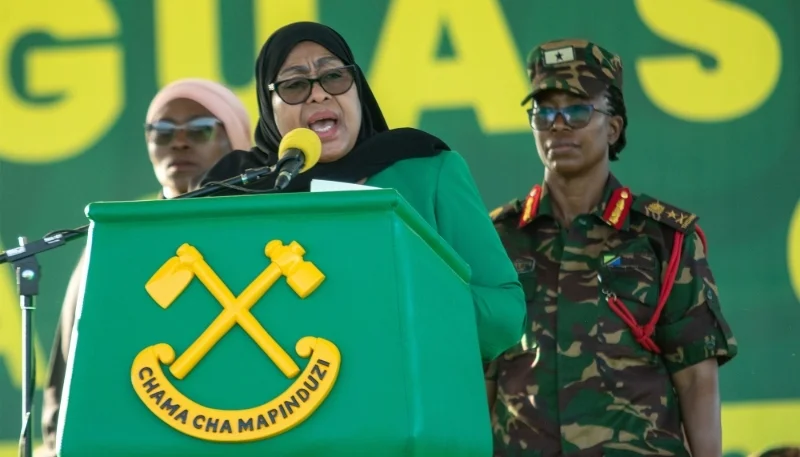As Tanzania heads to the polls on October 29, 2025, President Samia Suluhu Hassan, the country’s first female leader, seeks her first elected term.
Rising to power in 2021 after John Magufuli’s death, Hassan initially promised reform but now faces accusations of escalating repression. Critics, including Amnesty International, report increased arrests, disappearances, and violence, casting a shadow over the vote.
With opposition weakened, her Chama cha Mapinduzi (CCM) party is poised to extend its 60-year rule. This isn’t just an election it’s a test of democracy.
Early Hopes Fade
Hassan, a former vice president, sparked optimism by lifting bans on opposition rallies and promising openness. A 2021 cartoon by Gado depicted her as a “Dictatoress,” swapping a torch of liberty for a spiked club, hinting at skepticism.
Now, critics say she’s tightened control. Amnesty International’s October 2025 statement highlighted over 200 enforced disappearances since 2019, alongside arrests and alleged killings, accusing her administration of stifling dissent.
Hassan’s early reforms seem overshadowed by authoritarian tactics.
CCM’s Grip on Power
CCM, in power since Tanzania’s 1961 independence, faces little challenge. The opposition party Chadema, led by jailed leader Tundu Lissu, boycotted the election, demanding fair reforms. Lissu, who survived a 2017 assassination attempt, faces treason charges.
Another candidate, Luhaga Mpina, was disqualified for party rule violations. With only minor rivals, Hassan’s victory seems certain, but the U.S.-based Armed Conflict Location and Event Data group warns of a “repressive” CCM state.
Tanzania’s single-party dominance stifles democratic hopes.
Rights Abuses Mount
Reports of abuses are rising. In June 2025, UN experts noted a “pattern of repression,” citing missing activists like Kenya’s Boniface Mwangi and Uganda’s Agather Atuhaire, who reported abuse after attending Lissu’s trial.
Humphrey Polepole, a former ambassador, vanished in October after criticizing the government. His leaked resignation letter slammed the state’s disregard for law. Despite calls for his release, his fate remains unknown, fueling outrage.
These cases spotlight Tanzania’s darkening human rights record.
Hassan’s Leadership Style
Hassan, as CCM chair and commander-in-chief, wields significant power. She appointed her third intelligence chief in 2024, signaling efforts to consolidate control.
Her “Work and Dignity” campaign pushes farming and business growth, with her Four Rs—reconciliation, reforms, rebuilding, resilience, aiming to restore investor confidence after Magufuli’s tax policies.
Yet, critics argue she’s failed to unify, keeping a tight circle of advisors and sidelining opposition. Her leadership blends promise with growing control.
Public Frustration
Tanzanians expected freer speech and rallies, but many feel let down. “We hoped for openness, but it’s like the old days,” said a Dar es Salaam resident, speaking anonymously for safety. Low voter turnout is predicted as frustration grows over restricted choices.
The opposition’s absence and disqualifications have sparked calls for electoral reform, with some seeing Hassan’s rule as a continuation of CCM’s iron grip.
Citizens crave change but fear reprisal.
A Critical Moment
Hassan’s likely win on October 29 may extend CCM’s reign, but at a cost. Repression allegations and opposition crackdowns taint her legacy.
Can she pivot to true reform, or will Tanzania slide further from democracy? As the world watches, the election tests whether Hassan can balance power with the promise of freedom she once championed.
RELATED NEWS: Henriette Lagou Rallies Support in Ivory Coast Presidential Race




















